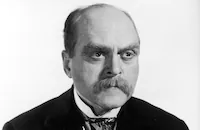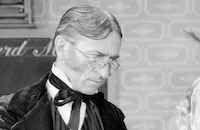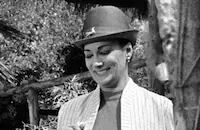And Now Tomorrow
Brief Synopsis
Cast & Crew
Irving Pichel
Alan Ladd
Loretta Young
Susan Hayward
Barry Sullivan
Beulah Bondi
Film Details
Technical Specs

Synopsis
Emily Blair, daughter of a wealthy manufacturing family, returns home to Blairtown after failing to find a cure for her deafness, which occurred in 1935 when she was stricken by meningitis. While on the train, Emily recalls how she collapsed from meningitis at a party celebrating her engagement to Jeff Stoddard, also of Blairtown's upper class. After she recovered, Emily insisted that she and Jeff postpone their wedding until she regained her hearing. Emily now arrives in Blairtown and shares a taxicab with Dr. Merek Vance, who grew up on the poor side of Blairtown and has been practicing medicine at a free clinic in Pittsburgh. Merek, whose father worked in the Blair's factory, is offended by Emily's snobbery, and is surprised to discover that she is an apt lip-reader. Unknown to Emily, Jeff and her sister Janice have fallen in love during her long absence, but Jeff refuses to tell Emily out of pity. Merek learns that he has been called back to Blairtown by Weeks, the town physician, because Weeks hopes that Merek, who has cured several deaf patients, can do the same for Emily. Merek prefers to work for the poor but reluctantly stays at Weeks's behest. That night, Merek joins Weeks for dinner at the Blair home, and tells Emily that he has disliked her since he was seven years old, when his father was laid off the week before Christmas and she stared disdainfully at him when his family showed up for the factory's annual Christmas gift giving. Emily snobbishly insists that as specialists were unable to cure her, she refuses to be Merek's "guinea pig." Emily soon relents, however, and begins treatment with Merek. During the next ten weeks, Merek tries curing Emily of her snobbery as well as her deafness. One day he is called to the poorer side of town to treat the sick son of the Gallos, who are factory workers, and Emily asks to accompany him. Angeletta Gallo dislikes Emily, who snubbed her in school because she was lower class, but after Emily assists Merek in an emergency mastoidectomy, which saves her son Tommy, Angeletta develops a new respect for Emily. After they leave the Gallos, Merek takes Emily to a coffee shop, and suggests that she will be wasted if she marries Jeff and continues to lead her selfish, wealthy lifestyle. When they return to the Blair home, Merek sees a light on in the empty apartment over the garage, and finds Jeff and Janice embracing there. Merek says nothing to them or to Emily. After five months, Emily is still not cured, and Merek informs her that his treatment is not working, and that the remaining specialist she was to see also cannot help her. Merek then confesses to Emily that he has fallen in love with her, but that she must learn humility. Emily thinks that Merek has simply taken pity on her, and is now taking advantage of her weakness, so they discontinue treatment. Emily then consents to marry Jeff, who is still unable to tell her about his love for Janice. When Emily learns that Merek has not yet returned to Pittsburgh because he is finishing an experiment on a deaf rabbit he cured, she demands that he administer the serum to her. Merek initially refuses, but Emily insists that she is now ready to be a "guinea pig." Shortly after he administers the serum, Emily collapses into a coma, and Weeks admonishes Merek for experimenting on her. Merek spends the night at the Blairs', anxiously hoping for Emily's recovery. By morning, when Weeks assures him that she will live, Merek returns to Pittsburgh. Emily finally awakens and delightedly discovers that her hearing has been restored. Emily then overhears a conversation in which Jeff admits his love for Janice, and she releases Jeff from their engagement, and realizes that Merek is her true love. On what was to be her wedding day, Emily travels to Pittsburgh, where Merek gladly receives her as his future wife.

Director

Irving Pichel
Cast

Alan Ladd

Loretta Young

Susan Hayward

Barry Sullivan

Beulah Bondi

Cecil Kellaway

Grant Mitchell
Helen Mack

Darryl Hickman

Anthony Caruso

Jonathan Hale
Conrad Binyon
Connie Leon
George Carleton
Leo Bulgakov
Ottola Nesmith
Edwin Stanley
Ronnie Rondell

James Millican
Charles Bates
Catherine Craig

Mae Clark
Frank Mayo
Russ Clark
Minerva Urecal
Joseph Granby
Betty Farrington
Edith Evanson
Harry Holman
Bobby Barber
Robert Wilbur

Ann Carter
Gloria Donovan
Merrill Rodin
Mary Eleanor Donahue
Constance Purdy

Olin Howlin

Byron Foulger
Mary Field
Hazel Keener

Doris Dowling
L. J. O'connor
Doodles Weaver
Jack M. Gardner
Jerry Steinmetz
Bunny Sunshine
Jimmie Dundee
Alec Craig
Stan Johnson
Harry Bradley
Crew
Raymond Chandler
B. G. Desylva
Hans Dreier
Farciot Edouart
Daniel L. Fapp
Earl Hayman
Edith Head
Ted Von Hemert
Fred Kohlmar
Duncan Mansfield
Joel Moss
Frank Partos
Hal Pereira
Oscar Rudolph
Wally Westmore
Victor Young

Film Details
Technical Specs

Articles
Doris Dowling (1923-2004)
Doris Dowling was born on May 15, 1923 in Detroit, Michigan. She showed an interest in acting at a young age, and after a few years of stage work in the Midwest, she joined her older sister, the leading lady Constance Dowling, in Hollywood. Paramount soon took notice of the sultry brunette with the soulful expression and husky voice, and promptly signed her to a contract.
She made a stunning film debut as Gloria, the hooker who befriends Ray Milland at a bar, becoming his good-humored confidante in The Lost Weekend (1945); she followed that up in the overlooked, film noir gem, The Blue Dahlia (1946), playing Alan Ladd's shrewish wife before being killed by a mystery killer in the first reel. She made another noir thriller, the forgettable, The Crimson Key (1947), playing, once again, an unsympathetic part before heading off to Europe. Once there, Italian director Giuseppe de Santis used her effectively in Bitter Rice (1948), arguably her best performance as the jewelry thief hiding among women rice workers in Northern Italy; another notable role was as Bianca in Orson Welles' French production of Othello (1951).
She returned to Hollywood in the late '50s, and spent the next three decades doing television work: Bonanza, Perry Mason, Alfred Hitchcock Presents, Barnaby Jones, and The Streets of San Francisco, just to name a few. She retired quietly from acting by the early '80s. She was briefly married to bandleader Artie Shaw (1952-56), and is survived by her son through that marriage, Jonathan; and her husband of 44 years, Leonard Kaufman.
by Michael T. Toole

Doris Dowling (1923-2004)
Quotes
Trivia
Notes
The working title of this film was Prisoners of Hope. Hollywood Reporter news items report the following information about the production: Joel McCrea and Franchot Tone were initially slated for the role of "Merek Vance," and Veronica Lake was considered for the role of "Janice Blair." This marked Alan Ladd's first film appearance following his discharge from the U.S. Army and the film debut of actress Doris Dowling (1923-2004). Olivia De Havilland starred with John Lund in a Lux Radio Theatre broadcast of the story on June 10, 1946.














